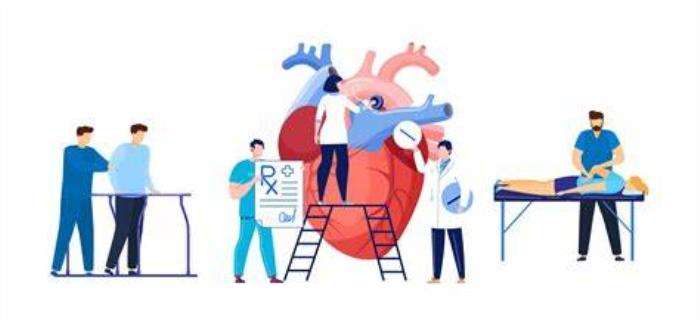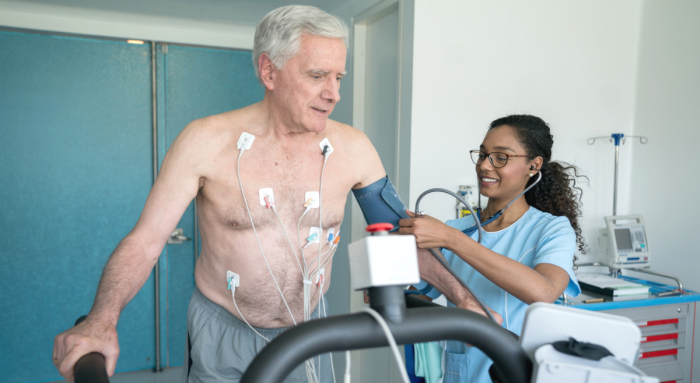Cardiac rehabilitation is a critical component of recovery for heart transplant patients. Following the surgery, patients face a period of physical and emotional healing, and rehabilitation plays an essential role in helping them regain strength, improve cardiovascular function, and adapt to lifestyle changes. Through structured exercise, education, and support, cardiac rehab optimizes recovery and helps patients transition back to normal activities while minimizing the risk of complications.
Medical disclaimer: This content is for general awareness and does not replace a doctor’s consultation. For diagnosis or treatment decisions, consult a qualified specialist.
The Goals of Cardiac Rehabilitation in Heart Transplant Patients
The primary goal of cardiac rehabilitation for heart transplant recipients is to improve overall heart function and physical endurance. Rehabilitation focuses on helping patients regain strength, increase stamina, and achieve better cardiovascular health through a carefully monitored exercise program. Additionally, it aims to reduce the risk of complications such as heart rejection, infections, and graft failure while enhancing long-term health outcomes.
Improving Heart Function and Strength Through Rehabilitation
Cardiac rehabilitation programs are designed to gradually improve heart function and strength, which is especially important after a transplant. Early on, patients may have limited physical endurance, but through progressive exercise, they can rebuild cardiovascular fitness. The rehabilitation team uses specific heart function metrics, such as blood pressure, heart rate, and oxygen levels, to tailor exercise regimens that help improve the efficiency and strength of the new heart.

How Cardiac Rehab Supports Recovery During the Early Post-Transplant Phase
In the early stages after a heart transplant, patients may experience fatigue, muscle weakness, and emotional stress. Cardiac rehabilitation helps address these challenges by providing a structured plan to gradually increase physical activity levels while ensuring that the heart is not overexerted. Regular monitoring during rehab ensures that the patient’s heart responds well to the activities, reducing the risk of complications and fostering a smoother recovery process.
The Role of Exercise in Enhancing Cardiovascular Health
Exercise is a cornerstone of cardiac rehabilitation and is key to improving the function of the transplanted heart. Regular physical activity strengthens the heart muscle, improves circulation, and helps reduce the risk of further cardiovascular issues. For transplant patients, appropriate exercise regimens help combat the effects of deconditioning, which can occur after prolonged illness or surgery, and improve overall energy levels and well-being.
Addressing Emotional and Psychological Well-being in Rehabilitation
Heart transplant surgery is not only a physical challenge but also an emotional journey. Patients often experience anxiety, depression, or feelings of isolation as they adjust to life after surgery. Cardiac rehabilitation programs provide psychological support, including counseling, stress management techniques, and social support groups. Addressing emotional well-being is vital for improving quality of life and encouraging patients to stay committed to their rehabilitation plan.
Developing a Personalized Rehabilitation Plan for Heart Transplant Patients
Each heart transplant patient’s recovery journey is unique, and a personalized rehabilitation plan is essential for optimal outcomes. The rehabilitation team works closely with the patient to understand their specific needs, health status, and goals. Based on this, they create a tailored exercise and lifestyle program that accommodates the patient’s abilities and challenges. This personalized approach ensures that the rehabilitation process is both safe and effective, promoting long-term health and well-being.
The Importance of Monitoring Vital Signs During Cardiac Rehab
Monitoring vital signs, including heart rate, blood pressure, and oxygen levels, is essential during cardiac rehabilitation to ensure that patients are progressing safely. Regular monitoring helps healthcare providers adjust the rehabilitation program to match the patient's physical capacity and prevent overexertion.
Nutrition and Lifestyle Modifications as Part of Cardiac Rehabilitation
Cardiac rehabilitation includes tailored nutritional counseling and lifestyle modifications aimed at improving heart health. Patients are encouraged to adopt heart-healthy diets, increase physical activity, manage stress, and avoid harmful habits such as smoking. These changes play a critical role in the long-term success of heart transplant recovery.
Preventing Complications and Rejection Through Rehabilitation
Cardiac rehabilitation helps prevent complications such as infection and graft rejection by improving the overall function of the heart and boosting the immune system. A structured rehab program also supports better medication adherence and helps manage any co-existing conditions that could impact heart transplant success.
How Cardiac Rehabilitation Improves Physical Endurance and Strength
One of the primary goals of cardiac rehab is to improve physical endurance and strength, allowing heart transplant recipients to regain independence. Gradually increasing the intensity of exercise helps patients build cardiovascular fitness, muscle strength, and stamina, contributing to a better quality of life.

Managing Medications During the Rehabilitation Process
Managing medications is crucial during cardiac rehabilitation, especially for transplant recipients who take immunosuppressive drugs to prevent rejection. Rehab professionals work closely with healthcare providers to ensure that medications are taken as prescribed and help patients understand their role in preventing complications.
The Role of Social Support and Family Involvement in Rehabilitation
Social support, particularly from family and close friends, plays a significant role in a patient’s rehabilitation journey. Encouraging loved ones to participate in rehabilitation sessions or to offer emotional support outside of sessions can increase motivation, reduce stress, and provide a sense of security for the patient.
Overcoming Barriers to Rehabilitation: Common Challenges and Solutions
Rehabilitation after a heart transplant can be challenging due to physical limitations, financial constraints, or emotional distress. Some common barriers include fatigue, lack of motivation, and limited access to rehabilitation programs. Addressing these challenges through tailored programs and support systems can help patients stay engaged and make progress.
Long-Term Benefits of Cardiac Rehab for Heart Transplant Recipients
Long-term benefits of cardiac rehabilitation include a reduction in hospital readmissions, improved heart function, a decreased risk of further cardiovascular problems, and enhanced overall health. Patients who complete rehab programs report a better quality of life, increased independence, and greater confidence in managing their health post-transplant.
How Cardiac Rehab Promotes a Return to Normal Life Post-Surgery
Cardiac rehabilitation plays a crucial role in helping heart transplant recipients return to their normal lives. Through physical therapy, education, and emotional support, patients regain physical abilities, learn to manage their health independently, and improve their mental well-being, enabling them to return to work, family activities, and social life.
The Role of Regular Follow-Up Appointments in Ensuring Rehabilitation Success
Follow-up appointments with healthcare providers are essential to track progress and address any concerns during the rehabilitation process. These appointments allow doctors to monitor heart function, adjust medications, and provide guidance on maintaining a healthy lifestyle to optimize long-term transplant success.
How Cardiac Rehabilitation Reduces the Risk of Future Heart Issues
Cardiac rehabilitation reduces the risk of future heart issues by teaching patients how to maintain heart health through exercise, diet, and medication management. Patients who adhere to rehab programs have a lower risk of developing complications like heart failure, coronary artery disease, and hypertension.
Collaboration Between Healthcare Providers in Managing Rehab Progress
A collaborative approach among cardiologists, rehabilitation specialists, dietitians, and psychologists ensures a comprehensive and personalized rehabilitation plan for each patient. This multidisciplinary team works together to monitor patient progress, make necessary adjustments, and provide holistic care throughout the rehabilitation process.
The Importance of Pre-Transplant Evaluations and Tests
Understand the critical role of pre-transplant evaluations and tests. This article explains the importance of comprehensive medical assessments to determine a patient's suitability for heart transplant surgery and ensure better outcomes after the procedure.
The Eligibility Criteria for Heart Transplant Surgery in India
Find out the eligibility criteria for heart transplant surgery in India. This blog outlines the factors that determine whether a patient is a suitable candidate for heart transplant, including age, overall health, and the severity of heart disease.
Conclusion: Enhancing Life Quality with Cardiac Rehabilitation After Heart Transplant
Cardiac rehabilitation is a vital part of the recovery process after heart transplant surgery. By improving physical health, enhancing emotional well-being, and reducing the risk of complications, rehab helps heart transplant recipients lead healthier, more active lives.
Best Heart Transplant in India
The Best Heart Transplant in India offers a life-saving solution for patients with end-stage heart failure, using advanced surgical techniques and comprehensive post-transplant care.
Best Heart Transplant Hospitals in India
The Best Heart Transplant Hospitals in India provide state-of-the-art facilities, skilled transplant specialists, and multidisciplinary teams for seamless patient care and recovery.
Heart Transplant Cost in India
The Heart Transplant Cost in India is structured to offer affordability while ensuring access to world-class transplant services and comprehensive care packages.
Best Heart Transplant Surgeons in India
The Best Heart Transplant Surgeons in India have extensive experience in performing complex transplants, ensuring precise techniques and personalized patient care for optimal outcomes.
FAQs
What is cardiac rehabilitation and why is it important after a heart transplant?
Cardiac rehabilitation is a medically supervised program that helps patients recover from heart transplant surgery. It focuses on improving physical fitness, managing medications, and providing emotional support to optimize long-term recovery and quality of life.
How soon after a heart transplant can I begin cardiac rehabilitation?
Patients typically begin cardiac rehabilitation a few weeks to a few months after a heart transplant, depending on their recovery status and doctor’s advice. Rehabilitation starts gradually to ensure safety and effectiveness.
What types of exercises are included in cardiac rehabilitation?
Cardiac rehabilitation programs include aerobic exercises, strength training, flexibility exercises, and breathing techniques tailored to each patient’s physical ability. The exercises help improve heart function and overall physical strength.
Can cardiac rehabilitation help prevent organ rejection?
While cardiac rehabilitation cannot directly prevent organ rejection, it promotes overall health and strengthens the heart, which may reduce the risk of complications, including rejection, by improving the patient’s physical state.
How does rehabilitation help with emotional recovery after a heart transplant?
Cardiac rehabilitation includes psychological support, counseling, and stress management techniques to address emotional challenges. It helps patients adjust mentally and emotionally to their new lifestyle and recovery process, reducing anxiety, depression, and isolation.